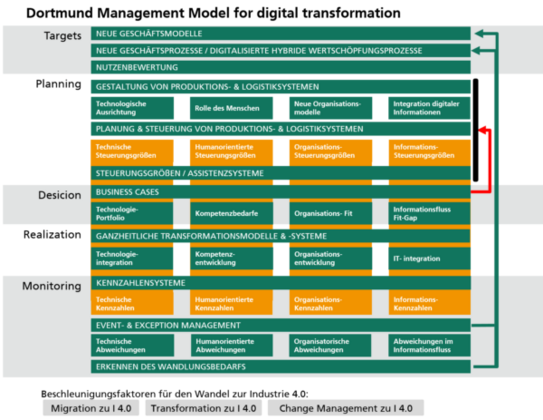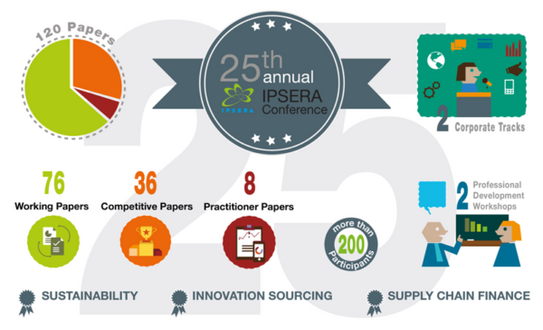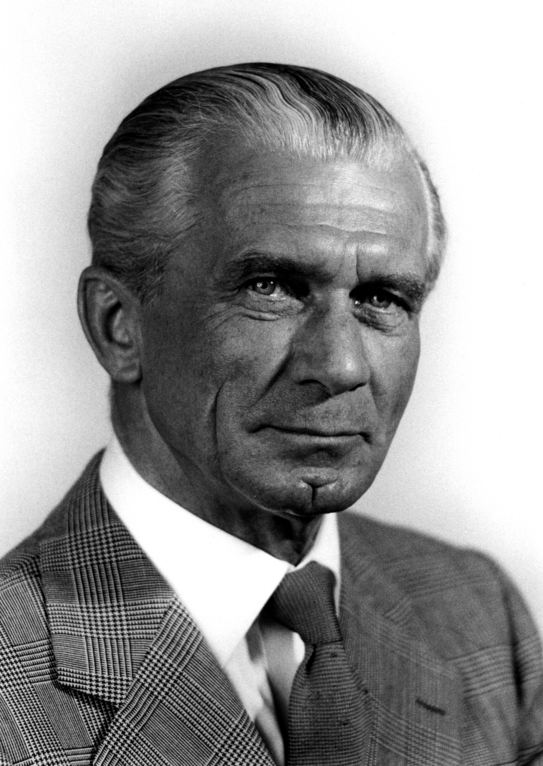Chronicle

The LFO celebrates its 50th anniversary under the leadership of Prof. Dr. habil. Michael Henke. We have taken this as an opportunity to look back on five decades of the chair's history in an anniversary brochure. With the support of alumni and current colleagues, we have managed to summarize the development of the chair in our anniversary brochure and to accompany it with exciting stories and anecdotes. (Download PDF)
We also take a closer look at the progress of logistics at the science location Dortmund. During this time, corporate logistics has evolved more and more from an executing instance of corporate logistics services to a controlling instance in value-added networks, i.e. supply chain management. Of course, this development does not stop at a significant anniversary; rather, we are using this success to continue to play a leading role: You can already find numerous starting points for the transformation in logistics in our brochure.
In the second year of the coronavirus pandemic, the focus was once again on digital teaching. Our wide range of courses, which have been adapted to the changed framework conditions and enriched with current findings from our research projects such as the Erasmus + Good Practices projects PERFECT and BlockNet , met with great approval from students. To ensure that students continue to enjoy a steep learning curve, we will increasingly rely on real-time formats in the future. This will make it possible to interact more with students and simplify the exchange of information about what they have learned.
Links to video messages for the anniversary ( on Youtube):
Playlist - all greetings
Prof. Dr. Manfred Bayer
Prof.Dr.Dr.h.c. Michael ten Hompel
Prof. Dr. Ing Uwe Clausen
Prof. Dr.-Ing. Axel Kuhn
Dr.-Ing. Tobias Hegmanns
Prof. Dr.-Ing. Boris Otto
Prof. Dr.-Ing. Jörn Mosler
Junior Professor Dr.-Ing. Anne Meyer
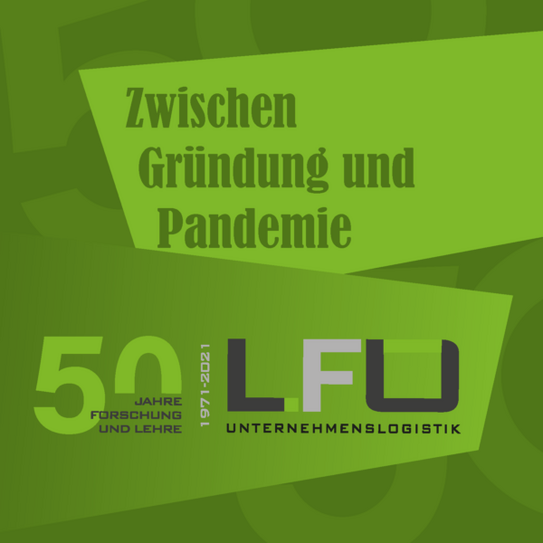
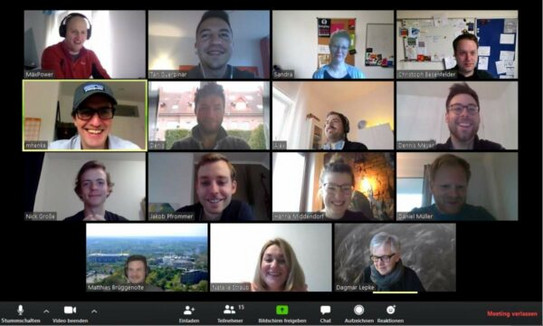
The LFO can look back on more than 40 years of success. But we don't need to look that far into the past. Just a glance at the highlights of the last few months shows that this success story is continuing.
Last year's highlights included the launch of two strategic initiatives: Blockchain Europe (https://blockchain-europe.nrw/) and Silicon Economy Logistics Ecosystem(https://www.silicon-economy.com/).
Blockchain Europe explores the potential of blockchain technology to make data exchange on B2B platforms tamper-proof and to automate and autonomize processes in the value chain. Silicon Economy Logistics Ecosystem focuses on the development of an open source infrastructure for the platform economy of the future and the realization of autonomous supply chain ecosystems.(https://blockchain-europe.nrw/)
Another important milestone was the extension of the Research Training Group "Adaptive Intelligence of Factories in a Dynamic Environment"(www.grk2193.tu-dortmund.de) into the second funding phase. The RTG investigates the tension between human decisions and autonomous systems in factory planning in order to enable adaptive intelligent factories.
We have also made a lot of progress in teaching. Due to the developments, we have stepped up our efforts to digitalize teaching and organized our teaching operations completely digitally. Thanks to the rapid changeover, we were able to maintain and run all courses. At the same time, we have implemented the further development of our teaching concepts in terms of content and didactics. In future, for example, research findings will be increasingly integrated into teaching and made applicable for students. In the course of online teaching, the block course at the Chinese-German University College (CDHK), where the LFO has been involved since 2011, was also held digitally for the first time, supported by modern video communication and chat systems.
Our success story is not only reflected in the development of our extensive fields of research and teaching, but also in the team behind it all. This is how we grew again in 2020. After all, innovative research projects need bright minds to develop novel solutions and make them available to the research community.
Even though we were not (yet) able to welcome our new researchers in person, they were quickly integrated into the work at the LFO as part of a remote onboarding process. In the following reports, you can read about how well this went, how our new team members experienced it personally and what else they have to report.
The department is growing and with it the number of our projects and innovations. 2019 was therefore a particularly eventful year for us.
Firstly, two research projects were launched: PERSIST and VISITS. PERSIST deals with the role of procurement and the challenges in times of digitalization as well as the skills and knowledge required in Procurement 4.0. The results are used in a modular course with gamification elements for successful knowledge transfer. VISITS is all about networking and interaction work in Smart Technical Services. For example, challenges are to be identified and interface management for good interaction work is to be analyzed in order to ultimately derive design rules for improving smart services.
On the other hand, CreaLOGtiv was successfully completed. In this project, creative business approaches from the game development industry were harnessed to meet the challenges associated with Industry 4.0 for skills in the logistics sector. The result was a realistic learning game environment based on virtual reality technologies that promotes process design skills in logistics and enables collaborative learning.
There are also innovations in teaching. For example, we have successfully subjected our courses to a reaccreditation process. As part of this process, teaching content was updated and a "flipped classroom" approach was pursued, in which an interactive exchange with students and new teaching concepts were established.
Furthermore, the 18th Maintenance Forum was held in cooperation with the Fraunhofer IML. The thematic focus this year was "Fit for Smart Maintenance". In exciting presentations, the future of maintenance was examined from a wide variety of perspectives by both high-ranking industry representatives and scientists. It became clear that smart maintenance is no longer an idea for the future, but a key driver for the digital transformation of many companies.
With the expansion of our chair, the available space also became scarce. For this reason, we set up "Area 42" - a room with workstations for student and research assistants, which can also be quickly converted into a meeting room if required.
So a lot has happened at the LFO. Despite the numerous innovations and projects, scientific knowledge was of course not neglected. Accordingly, the Dortmund Management Model, which forms the basis of our research work, was published in the "Handbook Industry 4.0". The model enables an integrated, process-oriented view of the management of Industry 4.0 and thus describes a continuous process for targeted change.
We are looking forward to the new year with excitement, as it is already becoming apparent that 2020 will be another special year for the LFO.
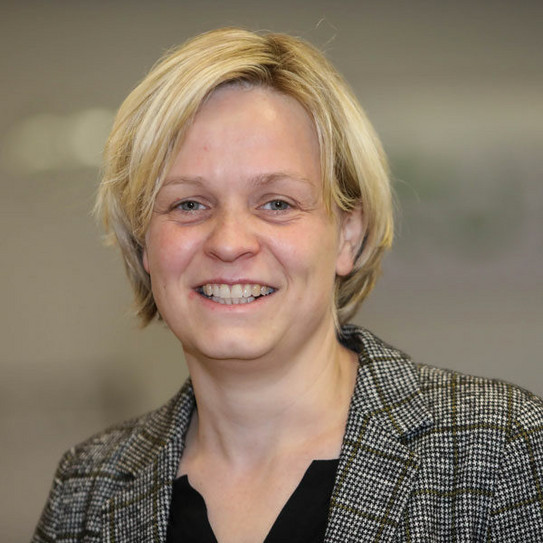
In order to adequately supervise and manage the growing number of academic staff and the associated increase in administrative tasks, we decided to expand the management team in 2018. In addition to senior engineer Natalia Straub and myself, Dr.-Ing. Christoph Besenfelder, after successfully completing his doctorate, and junior professor Dr.-Ing.
Anne Meyer holds the Junior Professorship for Digitalization in Corporate Logistics and Supply Chain Management at the Department of Mechanical Engineering and is administratively affiliated to the LFO. By submitting an additional application to the DFG, she was officially accepted into the Research Training Group 2193 "Adaptive Intelligence of Factories in a Dynamic and Complex Environment" with a doctoral position and enriches the consortium with her research expertise in the field of optimization and analytics. She is co-supervising the doctoral students at the LFO and is intensively involved in preparing the application for extension of the Research Training Group.
from the foreword to the 2017 annual report:
[...] we continued to consistently develop our central fields of work last year and focused on the challenges of digital transformation in corporate logistics and supply chain management. In doing so, it is very important to us that we make the results of our research and teaching work tangible and understandable. This applies in particular to the new technologies in additive manufacturing and in the areas of augmented and virtual reality. Our close collaboration with the Corporate Logistics department at Fraunhofer IML, where a virtual experimental field for the management of Industry 4.0 has been created in recent months, is helping us here; we are actively contributing our ideas and findings to this so-called VR Lab Supply Chain Management.
Over the past twelve months, we have also been able to make an important contribution to major initiatives in Germany as a center of science. For example, the LFO is involved in the Innovation Lab for Hybrid Services in Logistics as well as the High Performance Center for Logistics and IT. For both initiatives, we can utilize the results of our work in the central subject areas of the Chair. Conversely, these major projects also provide us with impetus that we can incorporate into future research projects and courses.
From the many exciting topics that have kept us busy over the past year, it is difficult to pick out just a few and go into them in a foreword without doing justice to others that are not particularly mentioned. All the topics are exciting and are waiting for you to read about them in the annual report. Overall, however, I would like to point out that we have further strengthened our position at the interface between technologies and management and have thus been able to further develop our Dortmund management model for Industry 4.0. This model should also help us in the future to further develop management approaches in the direction of the platform economy. I am firmly convinced that platforms - such as the one we are currently developing and expanding with the Social Networked Industry at our location - will significantly change our future economic life.

From March 20 to 23, 2016, Fraunhofer IML hosted the 25th IPSERA conference under the motto "Purchasing & Supply Management - from efficiency to effectiveness in an integrated Supply Chain Management". IPSERA, the International Purchasing and Supply Education and Research Association, is a global, interdisciplinary network for research and application of purchasing and supply management. With the support of the LFO, the conference welcomed over 200 leading academics and practitioners from the fields of purchasing and supply management, who presented forward-looking ideas and strategies in numerous lectures. Corporate Social Responsibility, Collaboration and Relationship Management, Financial Innovation, Purchasing Ambidexterity, Sustainability and Performance Measurement proved to be popular and promising topics among the participants from over 25 countries. Additional highlights included six exciting keynote speeches and a panel discussion on the conference's central theme, led by high-caliber representatives from business and research. The newly introduced Corporate Tracks, in which Deutsche Bank/WILO and Schaeffler each held a well-attended workshop, and the Professional Development Tracks, in which young scientists in particular were given space for their professional development, were also a success. Overall, the conference facilitated an intensive exchange between practitioners and academia, providing an ideal platform for influencing day-to-day operations and strategy in purchasing and supply management and promoting applied research. The wide range of positive feedback from speakers and participants further underpinned this impression.
Kickoff PERFECT
On February 11th, 2016, the kick-off meeting of the Erasmus+ project PERFECT (Purchasing Education & Research for European Competence Transfer) took place in Dortmund. The participants from Dortmund, Mainz, Twente, Staffordshire and Lappeenranta met already the evening before for a comfortable get-together at steak restaurant Pfefferkorn at the Phoenixsee in order to get in contact personally and bring up the first aspects with regard to project contents.
The kick-off meeting served mainly as a possibility for all participants to get to know the people with whom to cooperate during the next three years and for creating awareness of organizational and administrative rules as well as for scheduling the next meetings and implementing project management tools. Furthermore, it was important to reach a mutual understanding of goals and further approaches and to present the results of the first work package, which deals with discovering and supporting Purchasing & Supply Management (PSM) skills and capabilities by means of literature research and benchmarking studies of existing academic and practical programs.
The participants found the meeting to be very interesting and constructive due to a pleasant atmosphere and open discussions
from Michael Henke's foreword to the 2014 annual report:
"My first full year as holder of the Chair of Enterprise Logistics has flown by. Among other things, we used 2014 to combine the new areas of purchasing and supply management and finance that I brought to Dortmund with the original topics of the LFO and to develop them further together.
To anticipate one result of this strategic work [...] at this point: An important goal and result of the research work is and remains the effective utilization of new technologies and feasible management solutions for practical application in logistics, purchasing and production. This applies to corporate logistics and supply chain management in general and to the highly topical subject of "Industry 4.0" in particular. For the increasing comprehensive decentralization of value creation, suitable and new management approaches for the self-control and self-organization of logistics, production and purchasing must be further developed. This applies to large companies, but especially to small and medium-sized enterprises.
[...] In 2014, we began preparations for the 16th InFo (Maintenance Forum) and thus laid the foundations for a continuation of the established and scientific exchange in 2015 on maintenance, which is evolving into "smart maintenance" in the 4th industrial revolution. With EXCHAiNGE, The Supply Chainers' Conference, we have actively participated in the organization of an event for supply chain experts, which is already entering its third round in 2015 and is also intended to give us the opportunity to present some of our latest research topics to a wider specialist audience.
Here, as in many other application-oriented research projects, we work closely with the Corporate Logistics department at Fraunhofer IML. With the Graduate School of Logistics, we want to drive forward the international orientation of our subject areas in the coming months - not only for our topics, but also for the department and TU Dortmund University."


Prof. Dr. Michael Henke (42) is the new Head of the Chair of Enterprise Logistics in the Department of Mechanical Engineering at TU Dortmund University and Director of the Fraunhofer IML. He succeeds Prof. Dr. Axel Kuhn, who retired last year after more than 20 years in both positions. Henke, who previously held the Chair of Purchasing and Supply Management at the EBS European Business School in Wiesbaden, assumed his new duties on September 1, 2013.
"With Prof. Henke, we have gained a proven supply chain expert for logistics in Dortmund. In view of key future topics such as Industry 4.0 and Big Data, it is becoming increasingly important to interlink all disciplines more closely. As an economist, Michael Henke therefore complements our work perfectly and will provide new impetus for corporate planning both at the institute and at the chair," says Prof. Dr. Michael ten Hompel, Managing Director of the Fraunhofer IML.
After the 40th anniversary of the chair in 2011, 2012 was a year of change. On July 31, Prof. Dr. Axel Kuhn stepped down as head of the LFO after 19 years as chair and 39 years at TU Dortmund University. On October 2, 2012, during the evening event of the Future Logistics Congress, we bid him a fitting farewell with a moving speech by Dr. Volker Paetz, a long-time companion of the LFO and now manager at ThyssenKrupp Materials.
Tobias Hegmanns has been acting head of the chair since August 1.
Alongside this drastic change, it almost fades into the background that the Chair once again did an outstanding job in 2012: a diverse teaching portfolio with 18 regular courses, the supervision of 43 theses and projects as well as the processing of a total of nine ongoing or newly started research projects. Two new DFG projects were started in 2012 on the use of simulation in anticipatory change planning and the use-dependent maintenance of intralogistics systems. Another research proposal on the topic of flexible capacity planning and provision for kmU was approved by the AiF for 2013.


We look back on 2011 with joy and pride; joy because the past year was once again characterized by much success, and pride because we celebrated the 40th anniversary of our chair. We would like to highlight this event in particular.
40 years ago, Prof. Günter Lindner was commissioned to found a department of production engineering at the University of Dortmund, which he then successfully put into practice. On October 1, 1971, the Department of Production Engineering - later to be renamed Mechanical Engineering - was finally founded. The Chair of Factory Organization (LFO) was the founding chair and Prof. Lindner was the founding dean. He focused the Chair of Factory Organization on the aspects of industrial organization, factory and workshop planning, production control and management information, management techniques and maintenance. With a strong practical orientation, he laid the foundation for the LFO's current profile.
On the eve of this anniversary, on September 30, 2011, together with current and former lecturers, students, staff and other guests, we looked back on the past decades in which the LFO has developed into an integral part of today's Department of Mechanical Engineering.
The Chair of Factory Organization: an important partner in the EffizienzCluster LogistikRuhr
In January, the Federal Minister of Education, Prof. Dr. Annette Schavan, announced the winners of the second round of the Leading-Edge Cluster Competition, including our EffizienzCluster LogistikRuhr.
This large-scale project, unique in the logistics sector, covers the Ruhr region, which is the largest metropolitan region in Germany. More than 120 applicants along the logistics value chain have come together in 30 joint projects: from research and education to logistics technology providers and logistics service providers to end users. The cooperation between the educational and research institutions in Dortmund and Duisburg (TU Dortmund University, Fraunhofer IML and ISST and the University of Duisburg-Essen) is crucial.
In this context, the Chair of Factory Organization is an important partner in the EffizienzCluster LogistikRuhr. It conducts research and development together with industrial and logistics companies in three joint projects, with the declared aim of the EfficiencyCluster to develop innovative products and services which, guided by global megatrends, will prepare society for the changing framework conditions.


We were saddened to learn that Professor Dr.-Ing. Eugen Gülker, lecturer in maintenance at the Chair of Factory Organization from 1974 to 1999, passed away on 3 March 2009 at the age of 78 after a serious illness, but suddenly for all of us. In him, we have lost a highly esteemed university lecturer and committed scientist who, with his professional expertise and enthusiasm, but also with his humanity and understanding, made a significant contribution to establishing a new understanding of maintenance in research and teaching. This commitment also manifests itself in his services to the TU Dortmund University's Maintenance Forum, which took place for the 13th time in 2009. We will honour Prof. Dr. Gülker's memory.
With the founding of the Graduate School of Logistics in October 2009, it was possible to establish an institution with which the activities of the Graduate School of Production Engineering and Logistics can be continued and expanded with a focus on the work and research field of logistics. The Graduate School of Logistics sees itself as an institution of TU Dortmund University, which is operated in close cooperation with relevant departments of the universities of Duisburg/Essen, Paderborn and Münster and in which young scientists work on interdisciplinary and cross-location solutions for exciting research tasks in logistics. The business-oriented focus of the research topics ensures that the results achieved are highly application-oriented.
At the end of October, we also bid farewell to Ms Gabriele Klimmer, our long-serving secretary, after almost 16 years of service at the Chair of Factory Organization and her well-deserved retirement
In projects of the German Research Foundation (DFG), the German Federation of Industrial Research Associations (AiF) or the Federal Ministry of Education and Research (BmBF), various research questions of factory organization were dealt with in an application-oriented manner. Particularly noteworthy in 2008 is the Collaborative Research Center 559, which has dealt with questions of modeling large logistics networks from an interdisciplinary perspective over the past 10 years and to whose successful completion the LFO contributed with a sub-project.
In the area of teaching, the chair was able to acquire an e-learning project, among other things, in which the aim is to prepare and convey the teaching content on industrial project management in an innovative form together with our new lecturer for this topic - Dr. Frank Kühn. In addition, together with Division 2 of the Fraunhofer Institute for Material Flow and Logistics (IML), we again supervised over 40 student research projects and dissertations, most of which were carried out in cooperation with companies.


The Senate of the University of Dortmund decides to rename the university the Technical University.
July: Launch of the Collaborative Research Center 696 by the German Research Foundation. 5.5 million is available for the first four of twelve years of research into the growth sector of intralogistics.
November: The Chinese Academy of Sciences and the Institute of Industrial Technology in Guangzhou appoint Prof. Kuhn as Honorary Chairman.

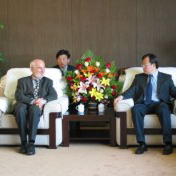
April: Around 100 experts from industry and science met at the Technical University of Dortmund and opened the discourse on the new research area of "fast ramp-up start-up management" at the Chair of Factory Organization.
For the first time, the Chair offers a compact seminar on computer technology for seniors in the newly built computer room of the Department of Mechanical Engineering (up to 30 people can work on special computer systems).
November: Honorary professorship awarded to A. Kuhn at the Beijing University of Science and Technology.
Since 1974, Dr. Eugen Gülker has represented the field of maintenance at the LFO through his teaching activities and participation in research projects. In October of this year, Mr. Gülker was awarded emeritus status and will remain associated with the chair by supervising ongoing doctoral theses.

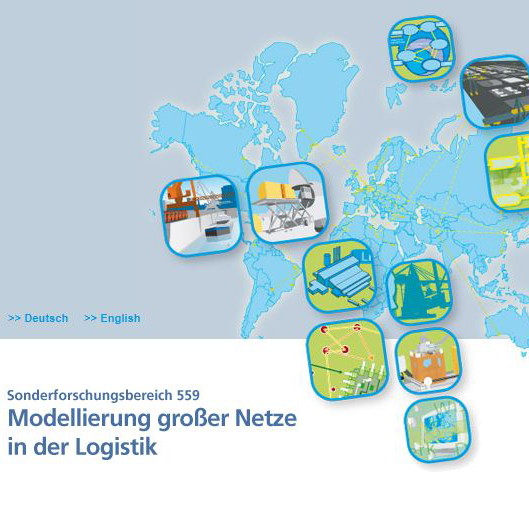
In 1998, the University of Dortmund was able to acquire the first collaborative research center in the field of logistics. Prof. Kuhn is the spokesperson for the Collaborative Research Center, which involves the Departments of Computer Science, Mechanical Engineering, Economics and Social Sciences as well as the Fraunhofer Institute for Material Flow and Logistics.
In September 1996, after a long planning period, the new mechanical engineering building on the North Campus of the University of Dortmund was completed. In October, the Chair of Factory Organization moved into its new premises together with many other institutions of the Department of Mechanical Engineering. The merging of the research facilities and lecture halls, which were previously spread across the North and South Campuses, has now given the department the opportunity to cooperate more closely in all areas for the benefit of the students and in the sense of a more intensive and regular exchange of ideas between the individual sub-areas of mechanical engineering
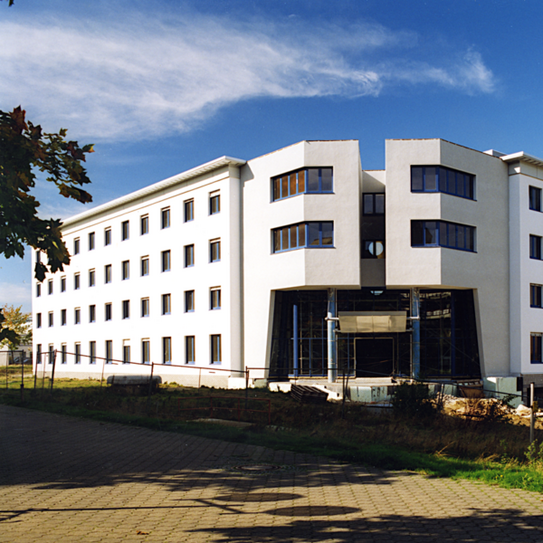
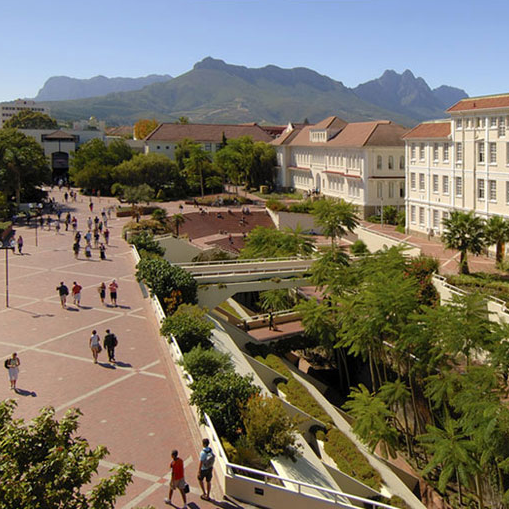
For the first time, a student exchange in Africa was organized with the University of Stellenbosch. The Chair of Factory Organization would like to expand this cooperation with this up-and-coming country in the future. Other destinations for our exchange students are Denmark, Finland and Ireland.
With the retirement of Professor Gerlach in March 1993, Professor Dr.-Ing. Axel Kuhn initially took over the management of the chair on an interim basis. Alongside Professor Jünemann, Professor Kuhn is the director of the Fraunhofer Institute for Material Flow and Logistics (IML) in Dortmund. This has broadened the basis of the close cooperation between LFO and IML, from which both sides benefit greatly.
Professor Gerlach accepted the appointment of Professor E.h. of the University in Beijing
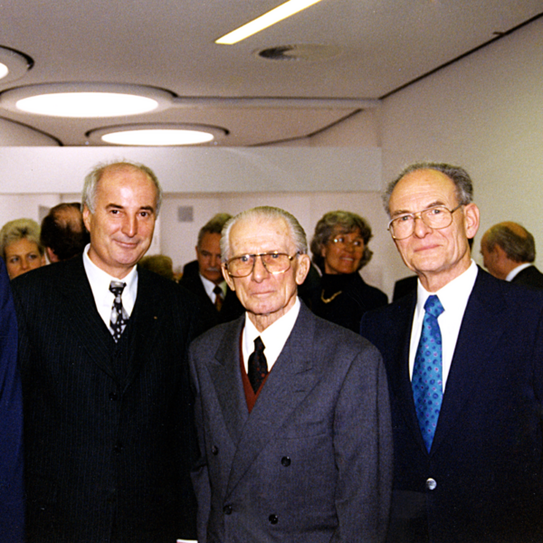
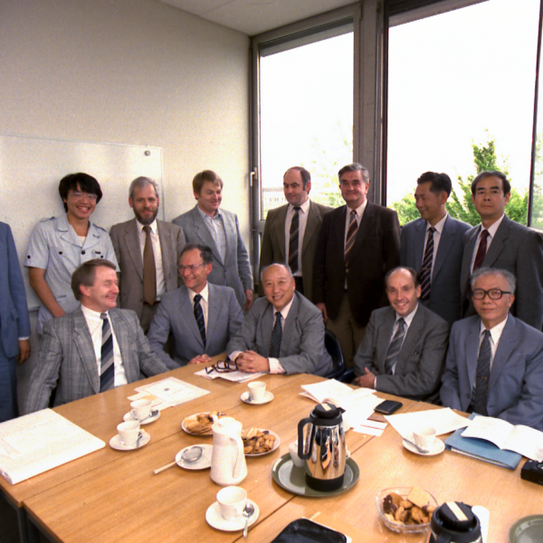
Professor Gerlach signs a framework partnership agreement with the Beijing University of Science and Technology in Beijing
1985 In the spring, on the initiative of Professor Gülker, the 1st Maintenance Forum of the Chair was held together with the German Committee for Maintenance (DKIH), to which invitations are extended every two years from then on.
In Beijing, Professor Jünemann and Professor Gerlach hold the first seminars as part of the partnership, during the course of which several Chinese students come to Dortmund as doctoral candidates.
Following the retirement of Professor Lindner, Professor Gerlach, who at the same time had an external appointment, was appointed to the Chair of Factory Organization in April, including the previous subject area of Production Control.
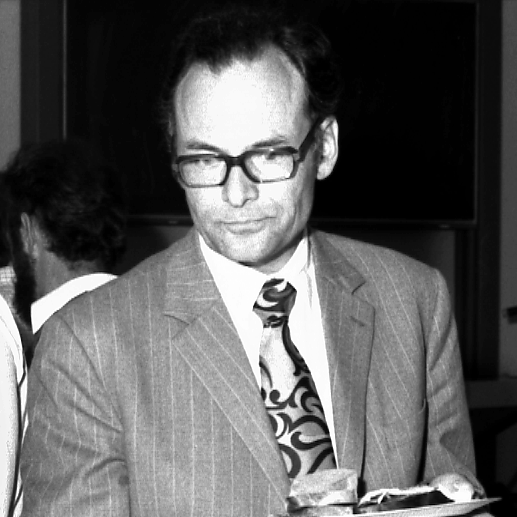

The area of maintenance has always been very important at the chair. This is why Dr.-Ing. Eugen Gülker, Head of Maintenance at Hoesch Hüttenwerke, was initially given a lectureship and later an honorary professorship for this subject area in 1974.
In 1972, the department of production control was assigned to the chair with its own professorship, for which Professor Dr. Horst-Henning Gerlach was appointed in December 1972. Professor Gerlach's tasks in research and teaching were initially in the areas of materials management, parts list systematics, part numbering and scheduling.
Numerical-analytical methods and instruments and their possible applications were taught by Professor Gerlach in an independent Operations Research lecture.
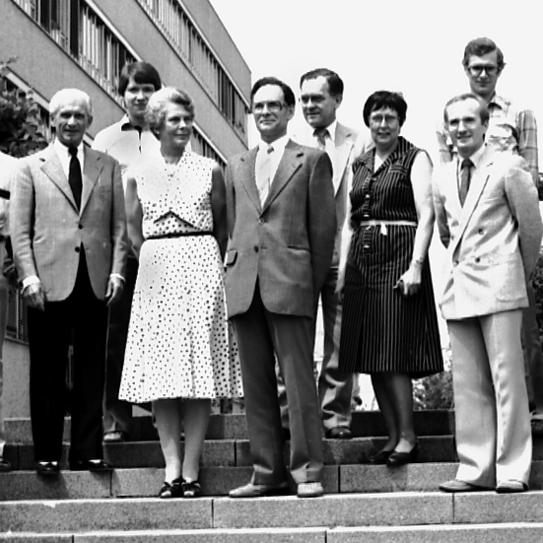
On October 1, 1971, the Chair of Factory Organization was founded as the first chair of the Department of Production Engineering (now: Faculty of Mechanical Engineering). The Chair of Factory Organization is thus the founding chair of the Department of Mechanical Engineering.
Professor Dipl.-Ing. Günter Lindner, then a member of the board of Demag AG, was appointed as the first professor of the Chair of Factory Organization. Professor Lindner had been appointed to an advisory committee by the founding rector of the University of Dortmund, Professor Dr. Martin Schmeißer, to set up a department of production engineering.
From the very beginning, Professor Lindner contributed the important practical orientation to the engineering education of the department. In the early years, research focused on the development of application-oriented methods for factory plant planning. Successes were achieved in the development of operational key figures as a basis for constant planning readiness.
The focal points set in the early years still form the field of work of the Chair of Factory Organization today:
- Industrial organization
- factory planning
- Production control and management information
- Management techniques
- Workshop planning
- Maintenance









